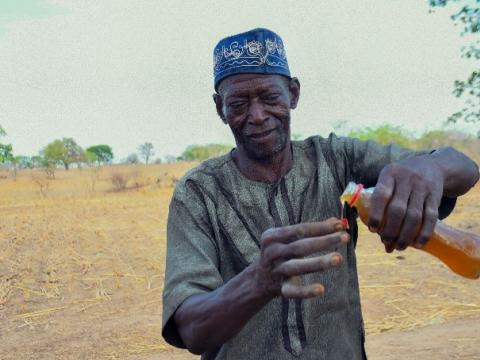Regreening Africa Project provides Multiple Benefits to Farmers

By: Francis Npong/WVG
Beekeeping and agroforestry are helping a retired civil servant, Akugre to meet his children's food, educational, health, and nutrition requirements. He would have faced challenges providing for his family and meeting household responsibilities. "Life would have been challenging for me in retirement if I were not engaged in beekeeping and agroforestry," he said. Akugre currently manages 11 colonised beehives in his community, Azupunpun. Community forests were restored and protected under World Vision's Farmer-Managed Natural Regeneration (FMNR) and Assisted Natural Regeneration (ANR) initiatives. Thanks to the Regreening Africa Project, Akugre is among over 11,000 lead beneficiary farmers in the Bawku West and Garu-Tempane Districts in the Upper East region who were identified, selected and trained by the Project.
“Each of these colonies hosts not less than 5000 honeybees. Aside from this, I also established nurseries to raise seedlings. I earn a lot of money engaging in these activities. It increased my income and improved my household food security. I can now meet my household's financial, food, and nutritional needs with ease”, he said.
Before the implementation of the Regreening Africa Project, Akugre had challenges feeding his family and meeting his financial obligations. Also rampant in his community were acute tree felling, bushfires that contributed to land degradation, and loss of forest cover and biodiversity.
“I had no idea how crucial beekeeping and agroforestry were to protecting the environment and sustaining human livelihoods until I participated in the Regreening Africa Project. Thanks to World Vision Ghana for the opportunity," he said. Through the Regreening Africa Project, World Vision Ghana introduced farmers in the Bawku West and Garu-Tempane Districts to FMNR, nurseries management and tree planting techniques aimed to reverse land degradation, improve soil fertility and build community and farmer resilience to climate change. World Vision Ghana's (WVG) implementation approach prioritises the protection of indigenous trees and wildlings.
The practice of FMNR contributed remarkably to establishing community-protected forests. These laid a solid foundation for the enactment and implementation of community by-laws against bushfires and indiscriminate wood extraction. This has resulted in improved environmental sustainability in the area. The by-laws have also resulted in increased public awareness of the dangers of bushfires and the need to preserve the local environment. The community has also come together to promote sustainable wood extraction and the use of natural resources.
The Regreening Africa Project Funded by the European Union and World Vision Australia trained and formed 11,920 lead farmers and fire volunteers to manage bushfires across project sites. It also trained 17,550 farmers on conservation agriculture practices and planted more than 200,000 seedlings cumulatively across project communities in its 5-years of implementation. “We stopped cutting down trees and burning bushes. Now we have forests where we practice beekeeping, which also serves as fodder for our animals," Akugre said.
Lead farmers in more than 350 project communities enjoyed multiple benefits: recovery and preservation of biodiversity, improved soil fertility, increased environmental agility, reduced tree felling and bushfires, and increased tree planting. “My life has changed. My attitude towards the environment has also improved for the better. Last year, I sold 4000 tree seedlings of diverse species to groups, communities, and individuals and made over 10,000 Ghana Cedis" he said.
Regreening Africa project funded by the European and World Vision Australia was a project that sought to reverse land degradation among 500,000 households and across one million hectares in eight countries in sub-Saharan Africa including Ghana. It was implemented by World Agroforestry (ICRAF), World Vision Ghana: Catholic Relief Services, National and Local Government Agencies, and communities.